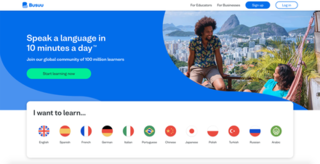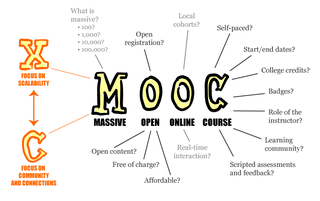Distance education, also known as distance learning, is the education of students who may not always be physically present at school, or where the learner and the teacher are separated in both time and distance. Traditionally, this usually involved correspondence courses wherein the student corresponded with the school via mail. Distance education is a technology-mediated modality and has evolved with the evolution of technologies such as video conferencing, TV, and the Internet. Today, it usually involves online education and the learning is usually mediated by some form of technology. A distance learning program can either be completely a remote learning, or a combination of both online learning and traditional offline classroom instruction. Other modalities include distance learning with complementary virtual environment or teaching in virtual environment (e-learning).

Christoph Meinel is a German computer scientist and professor of Internet technologies and systems at the Hasso Plattner Institute (HPI) of the University of Potsdam. In the years 2004 to 2023 he was the scientific director and CEO of the HPI and has developed the openHPI learning platform with more than 1 million enrolled learners. In 2019, he was appointed to the New Internet IPv6 Hall of Fame.

Busuu is a language learning platform on web, iOS and Android that allows users to interact with native speakers. In 2021, Chegg acquired Busuu for $436 million.

D2L is a Canada-based global software company with offices in Australia, Brazil, Europe, Singapore, and the United States.

A massive open online course or an open online course is an online course aimed at unlimited participation and open access via the Web. In addition to traditional course materials, such as filmed lectures, readings, and problem sets, many MOOCs provide interactive courses with user forums or social media discussions to support community interactions among students, professors, and teaching assistants (TAs), as well as immediate feedback to quick quizzes and assignments. MOOCs are a widely researched development in distance education, first introduced in 2008, that emerged as a popular mode of learning in 2012, a year called the "Year of the MOOC".

Coursera Inc. is a U.S.-based massive open online course provider founded in 2012 by Stanford University computer science professors Andrew Ng and Daphne Koller. Coursera works with universities and other organizations to offer online courses, certifications, and degrees in a variety of subjects. In 2023 more than 275+ universities and companies offer more than 4,000 courses through Coursera.

edX is an American for-profit online education platform owned by 2U since 2021. The platform's main focus is to manage a variety of offerings, including elite brand bootcamps.
MITx is the massive open online course (MOOC) program at Massachusetts Institute of Technology. A constituent program of MIT's Office of Digital Learning, MITx produces MOOCs from MIT departments and faculty. Prior to 2U's acquisition of edX, MITx courses appeared there. After the acquisition, courses appeared on MIT's own site. MITx also supports residential experiments with scalable learning technologies and research on digital learning. MOOCs offered through edX by MITx are open-enrollment and free to take. In September 2012, edX and MITx introduced the option to receive an ID verified certificate on some courses.

openHPI is a platform for massive open online courses (MOOC) in the field of computer science and information technology. It is hosted at the Hasso Plattner Institute (HPI) in Potsdam, Germany. openHPI is open to everyone, and participation is free of charge. Everybody can register and enroll for courses without any prerequisites. openHPI's courses are derived from HPI's bachelor and master programs in IT-Systems Engineering and cover both, foundations of information technology as well as highly topical innovations.
FutureLearn is a British digital education platform founded in December 2012. The company was acquired by Global University Systems in December 2022 and previously jointly owned by The Open University and SEEK Ltd. It is a massive open online course (MOOC), microcredential and degree learning platform. As of November, it included over 250 UK and international partners, including industry and government partners.
openSAP is an Enterprise MOOC platform for massive open online courses, or MOOCs. It is provided by SAP and hosted at the Hasso Plattner Institute in Potsdam, Germany. Everyone can enroll in openSAP courses, which are provided free of charge.

Iversity is a Berlin-based online education platform. Since October 2013, iversity has specialised in providing online courses and lectures in higher education, specifically MOOCs. Courses are free and open for anyone to enroll and participate. Many of them are conducted in English or German, but also in other languages. iversity cooperates with individual professors as well as different European universities. Some of the courses were winners of the MOOC Production Fellowship held in early 2013. iversity.org officially launched the MOOC platform online in October 2013 and as of February 2015 has a user base of 600,000 online learners, enrolled in 63 courses offered by 41 partner universities. iversity is the only MOOC platform offering courses with ECTS-integration. iversity has branch offices in Bernau bei Berlin, Germany and Berlin.

SWAYAM is an Indian government portal for free open online course (MOOC) platform providing educational courses for university and college learners.

Edraak is a non-profit massive open online course (MOOC) portal established by Queen Rania al Abdallah of Jordan for the promotion of knowledge in the Arab world. It is considered the first non-profit and pan-Arab online educational platform that offers courses for free to learners worldwide. The MOOC platform operates in partnership with the Harvard-Stanford-MIT consortium called edX and is headquartered in Amman.
Kannu is a learning management system, purpose-built for creative education in music, arts, and design. It was released by California-based company Kadenze, Inc. ("Kadenze") in 2014 after the success of its MOOC platform, which Kannu is modeled after.

Online learning involves courses offered by primary institutions that are 100% virtual. Online learning, or virtual classes offered over the internet, is contrasted with traditional courses taken in a brick-and-mortar school building. It is a development in distance education that expanded in the 1990s with the spread of the commercial Internet and the World Wide Web. The learner experience is typically asynchronous but may also incorporate synchronous elements. The vast majority of institutions utilize a learning management system for the administration of online courses. As theories of distance education evolve, digital technologies to support learning and pedagogy continue to transform as well.
Language MOOCs are web-based online courses freely accessible for a limited period of time, created for those interested in developing their skills in a foreign language. As Sokolik (2014) states, enrolment is large, free and not restricted to students by age or geographic location. They have to follow the format of a course, i.e., include a syllabus and schedule and offer the guidance of one or several instructors. The MOOCs are not so new, since courses with such characteristics had been available online for quite a lot of time before Dave Cormier coined the term 'MOOC' in 2008. Furthermore, MOOCs are generally regarded as the natural evolution of OERs, which are freely accessible materials used in Education for teaching, learning and assessment.
Open Educational Practices in Australia refers to the development, implementation and use of Open educational resources (OER), open access, open learning design, open policies, and Massive Open Online Courses (MOOCs) to open up education in Australia.
Open educational resources in Canada are the various initiatives related to open education, open educational resources (OER), open pedagogies (OEP), open educational practices (OEP), and open scholarship that are established nationally and provincially across Canadian K-12 and higher education sectors, and where Canadian based inititatives extend to international collaborations.
MicroMasters programs are a series of online graduate level courses offered by universities through edX that one can take to develop standalone skills for career advancement or earn graduate level credentials.











